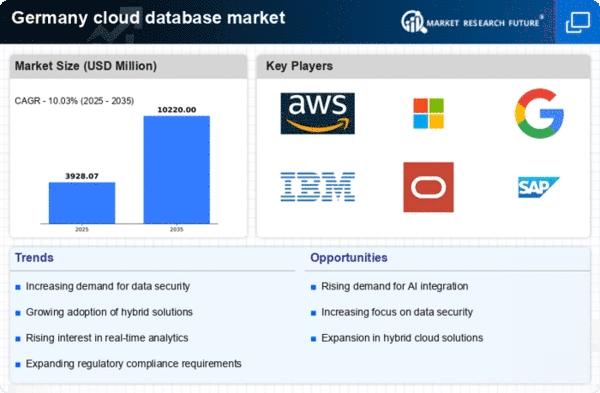Increased Focus on Data Analytics
The cloud database market in Germany is witnessing an increased focus on data analytics, which serves as a crucial driver for growth. Organizations are recognizing the value of data-driven decision-making, leading to a surge in demand for databases that support advanced analytics capabilities. The integration of analytics tools with cloud databases allows businesses to derive actionable insights from their data, enhancing operational efficiency. Recent reports suggest that the analytics segment within the cloud database market is expected to grow by 20% annually, reflecting the growing importance of data analytics in strategic planning. This emphasis on analytics not only propels the cloud database market forward but also fosters a culture of data-centricity among German enterprises.
Rising Demand for Scalable Solutions
The cloud database market in Germany experiences a notable surge in demand for scalable solutions. As businesses expand, they require databases that can grow alongside their operations. This trend is particularly evident in sectors such as e-commerce and finance, where data volumes are increasing exponentially. According to recent data, the cloud database market in Germany is projected to reach €2 billion by 2026, reflecting a compound annual growth rate (CAGR) of approximately 15%. Companies are increasingly opting for cloud databases to ensure flexibility and scalability, allowing them to manage large datasets efficiently. This rising demand for scalable solutions is a key driver in the cloud database market, as organizations seek to enhance their operational capabilities while minimizing costs.
Emergence of Industry-Specific Solutions
The emergence of industry-specific solutions is a notable trend within the cloud database market in Germany. As various sectors, including healthcare, finance, and manufacturing, face unique data challenges, there is a growing demand for tailored cloud database solutions. These industry-specific offerings are designed to address specific regulatory, operational, and analytical needs, thereby enhancing efficiency and effectiveness. Recent analyses indicate that the market for industry-specific cloud databases is expected to grow by 18% over the next five years. This trend not only drives innovation within the cloud database market but also enables organizations to leverage specialized tools that align with their operational requirements.
Regulatory Compliance and Data Sovereignty
Regulatory compliance and data sovereignty are pivotal factors influencing the cloud database market in Germany. With stringent data protection laws such as the General Data Protection Regulation (GDPR), organizations are compelled to adopt cloud solutions that ensure compliance with local regulations. This necessity drives the demand for cloud databases that offer robust security features and data residency options. As of 2025, approximately 70% of German businesses prioritize compliance when selecting cloud database providers. This focus on regulatory adherence not only shapes the cloud database market landscape but also encourages providers to enhance their offerings to meet compliance requirements, thereby fostering trust among users.
Shift Towards Remote Work and Collaboration
The cloud database market in Germany is significantly influenced by the shift towards remote work and collaboration. As organizations adapt to new working environments, the need for accessible and collaborative data solutions has intensified. Cloud databases facilitate real-time data sharing and collaboration among remote teams, enhancing productivity and decision-making processes. Recent statistics indicate that over 60% of German companies have adopted cloud-based solutions to support remote work initiatives. This trend not only drives the adoption of cloud databases but also encourages innovation in data management practices. The cloud database market is thus positioned to benefit from this ongoing transformation in work culture, as businesses prioritize tools that support remote collaboration.
















